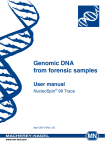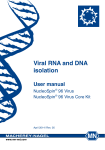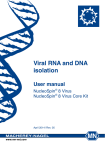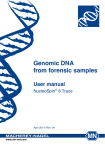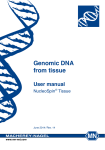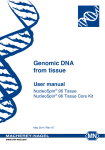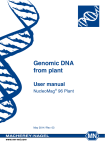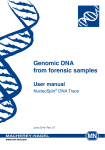Download NucleoSpin® 8 Plasmid (Core Kit) - MACHEREY
Transcript
Plasmid DNA purification User manual NucleoSpin® 8 Plasmid NucleoSpin® 8 Plasmid Core Kit April 2014 / Rev. 03 Plasmid DNA purification Table of contents 1 Components 4 1.1 Kit contents 4 1.2 Reagents to be supplied by user 5 2 Product description 6 2.1 The basic principle 6 2.2 Kit specifications 6 2.3 Required hardware 8 2.4 Recommended accessories for use of the NucleoSpin® 8 Plasmid Core Kit 9 2.5 Automated processing on robotic platforms 10 2.6 Growth of bacterial cultures 11 2.7 Elution procedures 12 3 Storage conditions and preparation of working solutions 13 4 Safety instructions 14 5Protocols 16 ® 5.1NucleoSpin 8 Plasmid – manual vacuum processing 16 5.2NucleoSpin® 8 Plasmid – elution of DNA using a centrifuge 25 6Appendix 26 6.1Troubleshooting 26 6.2 Ordering information 29 6.3 Product use restriction / warranty 30 MACHEREY-NAGEL – 04 / 2014, Rev. 03 3 Plasmid DNA purification 1 Components 1.1 Kit contents NucleoSpin® 8 Plasmid 1 2 3 12 x 8 preps 60 x 8 preps REF 740621 740621.5 Resuspension Buffer A1 75 mL 150 mL Lysis Buffer A2 75 mL 150 mL Neutralization Buffer A3 100 mL 200 mL Wash Buffer AW 100 mL 500 mL Wash Buffer A4 (Concentrate)1 100 mL 4 x 100 mL Elution Buffer AE2 30 mL 125 mL RNase A (lyophilized)1 30 mg 60 mg NucleoSpin® Plasmid Binding Strips (transparent rings) 12 60 NucleoSpin® Plasmid Filter Strips (purple rings) 12 60 Culture Plate (including Gaspermeable Foil) 1 5 Rack of Tube Strips3 1 5 MN Wash Plate 1 5 User manual 1 1 For preparation of working solutions and storage conditions see section 3. Composition of Elution Buffer AE: 5 mM Tris/HCl, pH 8.5 1 rack = 12 strips with 8 tubes each, Cap Strips included 4 MACHEREY-NAGEL – 04 / 2014, Rev. 03 Plasmid DNA purification NucleoSpin® 8 Plasmid Core Kit 48 x 8 preps REF 740461.4 Resuspension Buffer A1 150 mL Lysis Buffer A2 150 mL Neutralization Buffer A3 200 mL Wash Buffer A4 Concentrate)1 2 x 100 mL Elution Buffer AE2 125 mL RNase A (lyophilized)1 60 mg NucleoSpin® Plasmid Binding Strips (transparent rings) 48 NucleoSpin® Plasmid Filter Strips (purple rings) 48 User manual 1 1.2 Reagents to be supplied by user • 1 2 96–100 % ethanol For preparation of working solutions and storage conditions see section 3. Composition of Elution Buffer AE: 5 mM Tris/HCl, pH 8.5 MACHEREY-NAGEL – 04 / 2014, Rev. 03 5 Plasmid DNA purification 2 Product description 2.1 The basic principle The NucleoSpin® 8 Plasmid procedure is a modified version of the Birnboim and Doly1 alkaline lysis plasmid Mini prep protocol. Bacterial cultures are harvested by an initial centrifugation step. After resuspension of the pelleted bacteria (Buffer A1) and alkaline cell lysis (Buffer A2), a neutralization and binding buffer (Buffer A3) containing chaotropic salts is added. Resulting bacterial crude lysates are cleared by vacuum filtration with the NucleoSpin® Plasmid Filter Strips. The cleared lysates containing the plasmid DNA are collected into the NucleoSpin® Plasmid Binding Strips. The chaotropic salt leads to a reversible adsorption of the plasmid DNA to the NucleoSpin® silica membrane during the second vacuum-filtration step. High purity of the final plasmid DNA preparation is achieved by complete removal of cellular contaminants, salts, detergents, and other compounds by subsequent washing steps. Highly pure plasmid DNA is finally eluted with Elution Buffer AE (5 mM Tris / HCl, pH 8.5) or water (pH 8.0–8.5) and can directly be used for downstream applications. 2.2 Kit specifications • NucleoSpin® 8 Plasmid is designed for the manual or automated small-scale purification of high-copy plasmid DNA from E. coli in the flexible 8-well strip format. • NucleoSpin® 8 Plasmid kits (REF 740621 / .5) are supplied with all accessory plates for highest convenience. • The NucleoSpin® 8 Plasmid Core Kit (REF 740461.4) provides the buffers, RNase A, NucleoSpin® Plasmid Filter Strips, and NucleoSpin® Plasmid Binding Strips. Accessory components (e.g., culture plates, elution plates, MN Wash Plate, and Wash Buffer AW) are not provided with the core kit but can be individually selected from a variety of suitable accessories (see section 2.4 for further information). This allows highest flexibility for the user. Please note: All given specifications or information in this manual refer equally to the NucleoSpin® 8 Plasmid kit (REF 740621 / .5) as well as to the NucleoSpin® 8 Plasmid Core Kit (REF 740461.4). 1 • The kits allow for easy automation on common liquid handling instruments. For more information about the automation process and the availability of ready-torun scripts for certain platforms, please refer to section 2.5 and / or contact your local distributor or MN directly. • Using the NucleoSpin® 8 Plasmid kits allows simultaneous manual processing of up to 48 samples typically within less than 45 minutes. Actual processing time depends on the configuration of the liquid handling system used. Birnboim, H.C. & Doly, J. (1979) Nucleic Acids Res. 7, 1513-1523. 6 MACHEREY-NAGEL – 04 / 2014, Rev. 03 Plasmid DNA purification • Typically yields of 5–15 μg plasmid DNA can be purified from 1.5 mL overnight cultures. • Yield depends on copy number and plasmid size, selected culture medium, and bacterial host strain. • The DNA binding capacity is about 20 μg. The final concentration of the eluted DNA is 50–200 ng/μL (depending on the elution buffer volume and the bacterial culture). • Typically, the A260 / A280 ratio is > 1.8. Eluted DNA is ready-to-use for many downstream applications. Kit specifications at a glance NucleoSpin® 8 Plasmid Parameter Format 8-well strips Processing Manual or automated, vacuum Lysate clarification Sample material 8-well filter strips 1–5 mL E. coli culture Vector size < 15 kbp Typical yield 4–6 μg/mL E. coli culture Elution volume 75–150 μL Preparation time 45 min/6 strips Binding capacity 20 μg MACHEREY-NAGEL – 04 / 2014, Rev. 03 7 Plasmid DNA purification 2.3 Required hardware This kit is intended for use under vacuum. A support protocol for elution under centrifugation is included (see section 5.2). A support protocol for complete processing under centrifugation is available from our technical service ([email protected]). Vacuum processing The NucleoSpin® 8 Plasmid kits can be used manually with the NucleoVac 96 Vacuum Manifold (see ordering information). Additionally, a suitable centrifuge for harvesting the bacteria (either plate or tube centrifuge) and for the optional elution step under centrifugation is required. For processing the 8-well strips under vacuum, the Starter Set A (see ordering information) containing Column Holders A and NucleoSpin® Dummy Strips is required. For automation on laboratory platforms with standard 96-well plate manifolds, Starter Set A is also required 8 MACHEREY-NAGEL – 04 / 2014, Rev. 03 Plasmid DNA purification 2.4 Recommended accessories for use of the NucleoSpin® 8 Plasmid Core Kit The NucleoSpin® 8 Plasmid Core Kit provides all buffers (except optional Wash Buffer AW), RNase A, and NucleoSpin® Filter / Binding Strips. Accessory plates (e.g., culture blocks, elution plates) are not provided with the core kit. The condensed kit composition, along with a large variety of separately available accessories, allows for an optimal adjustment of the kit to individual user needs. The user can select additional consumables according to his / her requirements for highest flexibility. For use of NucleoSpin® 8 Plasmid Core Kit, follow the standard protocols (see section 5.1 or 5.2, respectively). Recommended accessories for use of the NucleoSpin® 8 Plasmid Core Kit are available from MACHEREY-NAGEL. For ordering information, please refer to section 6.2. Protocol step Suitable consumables, not supplied with the core kits Remarks Cultivation of bacteria Culture Plates Square-well Blocks with Gaspermeable Foil Wash step MN Wash Plates MN Wash Plate minimizes the risk of cross contamination (vacuum processing only) Buffer AW Recommended additional wash buffer for bacterial host strain with high endogenous nuclease activity (e.g., E. coli HB 101, BMH 71-18 mutS, JM, or any wildtype strains) or for improvement of sequencing results Elution Plate U-bottom Not suitable for elution by centrifugation Elution or Rack of Tube Strips (including Cap Strips) MACHEREY-NAGEL – 04 / 2014, Rev. 03 9 Plasmid DNA purification 2.5 Automated processing on robotic platforms NucleoSpin® 8 Plasmid can be used fully automated on many common laboratory workstations. For the availability of scripts and general considerations about adapting NucleoSpin® 8 Plasmid on a certain workstation, please contact MN. Full processing under vacuum enables complete automation without the need of centrifugation steps, regarding the drying of the binding membrane and elution step. The risk of cross-contamination is reduced by optimized vacuum settings during the elution step and by the improved shape of the outlets of the NucleoSpin® Plasmid Binding Strips. Drying of the NucleoSpin® Plasmid Binding Strips under vacuum is sufficient because the bottom of the strip is protected from buffer residues during the washing steps by the MN Wash Plate. As a result, we recommend trying to integrate the MN Wash Plate into the automated procedure. The MN Frame (see ordering information) can be used to position the disposable MN Wash Plate inside the vacuum chamber. This also reduces the risk of cross-contamination, as common metal adaptors tend to get contaminated by gDNA. Thorough cleaning of the vacuum chamber is recommended after each run to prevent gDNA-containing aerosols from forming. Visit MN online at www.mn-net.com or contact your local MACHEREY-NAGEL distributor for technical support regarding hardware, software, setup instructions, and selection of the protocol. Several application notes of the NucleoSpin® 8 Plasmid kit on various liquid handling instruments can also be found at www.mn-net.com under Bioanalysis / Literature. 10 MACHEREY-NAGEL – 04 / 2014, Rev. 03 Plasmid DNA purification 2.6 Growth of bacterial cultures 2.6.1 Selection of culture media The cultivation of cells is recommended at 37 °C in LB (Luria-Bertani) medium at constant shaking (200–250 rpm). Alternatively, rich media like 2 x YT or TB (Terrific Broth) can be used. By using 2 x YT or TB, bacteria grow faster and reach the stationary phase much earlier than in LB medium (≤ 12 h) in culture tubes or flasks. This may lead to a higher percentage of dead or starving cells when starting the preparation. The resulting plasmid DNA from overgrown cultures may be partially degraded or contaminated with chromosomal DNA. 2.6.2 Cultivation of bacteria in a Square-well Block Use the 96-well Square-well Block (Culture Plate; not included in the core kits) for growing bacteria. Add 1.2–1.5 mL of selected medium (with appropriate antibiotic, e.g., 100 μg/mL ampicillin) to each well of the Square-well Block. To avoid crosscontamination due to spillage during incubation, do not exceed a total culture volume of 1.5 mL. Inoculate each well with a single bacterial colony. Cover the Square-well Block with the Gas-permeable Foil. Grow the culture in a suitable incubator at 37 °C for 16–24 h with vigorous shaking (200–400 rpm). The Square-well Block may be fixed to the shaker with large-size flask clamps (for 2-L flasks) or tape. Note: The yield of plasmid DNA depends on growth conditions, bacterial strain, and cell density of the culture as well as on the size and copy number of the vector. Use of high-copy number plasmids such as pUC, pBluescript, or pGEM and E. coli strains like DH5α or XL1 Blue are recommended. Growth times of 16–24 h are usually sufficient. However, for poorly growing bacteria, prolonged incubation times of up to 30 h may be required. 2.6.3 Cultivation of bacteria in tubes Use 1–5 mL of appropriate culture medium. Depending on the bacterial strain and copy number of the plasmid, up to 5 mL LB medium or 2.5 mL 2 x YT or 2.5 mL TB medium can be used. Grow bacteria with vigorous shaking (200–250 rpm) for 10–14 h. Optional: If the liquid handling instrument does not allow the use of selected culture tubes, transfer the bacterial culture from the tubes into a suitable Square-well Block. For this, transfer 1.5 mL of the culture to each well of the Square-well Block. Harvest the cultures by centrifugation. Discard supernatant. Usually 1.5 mL of culture are sufficient for DNA preparation. However, if necessary, add additional 1.0–1.5 mL bacterial culture to each well of the Square-well Block, centrifuge again, and discard the supernatant. Do not use more than 5 mL LB culture or 2.5 mL rapid growing bacterial strain (using 2 x YT or TB medium) because lysis efficiency might be lower when using cell pellets which are too large. MACHEREY-NAGEL – 04 / 2014, Rev. 03 11 Plasmid DNA purification 2.7 Elution procedures See the following table for correlation between the dispensed elution buffer volume and typical recoveries following the standard protocol under vacuum. The recommended dispense volume of elution buffer is 125 μL. Correlation between dispensed elution buffer volume and typical recovery Dispensed elution buffer 75 μL 100 μL Recovered elution buffer containing PCR-products 30 ± 5 μL 55 ± 5 μL 125 μL 150 μL 175 μL 80 ± 5 μL 105 ± 5 μL 130 ± 5 μL Recovery, % Recovered DNA, µg Concentration, ng/µL Recovered DNA, µg Concentration, ng/µL Recovery, % Dispensed elution buffer, µL Recovered elution buffer, µL Figure 1: Recovery rate and concentration depend on elution volume. 10 μg of pBluescript pasmid were purified with NucleoSpin® 8 Plasmid and eluted with the indicated elution buffer volumes. 12 MACHEREY-NAGEL – 04 / 2014, Rev. 03 Plasmid DNA purification 3 Storage conditions and preparation of working solutions Attention: Buffers A3 and AW contain chaotropic salts which are irritant. Buffer A2 contains SDS and sodium hydroxide which are irritant and hazardous. Wear gloves and goggles! CAUTION: Buffers A3 and AW contain guanidine hydrochloride which can form highly reactive compounds when combined with bleach (sodium hypochlorite). DO NOT add bleach or acidic solutions directly to the sample-preparation waste. Storage conditions: • All kit components can be stored at room temperature (18–25 °C) and are stable up to one year. Always keep buffer bottles tightly closed, especially if buffers are preheated during the preparation. • Sodium dodecyl sulfate (SDS) in Buffer A2 may precipitate if stored at temperatures below 20 °C. If a precipitate is observed in Buffer A2, incubate the bottle at 30–40 °C for several minutes and mix well. Before starting any NucleoSpin® 8 Plasmid protocol, prepare the following: • Before the first use of the kit, dissolve RNase A with 1 mL of Buffer A1 and vortex. Transfer all of the resulting solution into the Buffer A1 bottle and mix thoroughly. Indicate date of RNase A addition. Store Buffer A1 containing RNase A at 4 °C. The solution will be stable at this temperature for at least six months. • Wash Buffer A4: Add the indicated volume of ethanol (96–100 %) to Buffer A4 Concentrate before use. Mark the label of the bottle to indicate that ethanol was added. NucleoSpin® 8 Plasmid REF Wash Buffer A4 (Concentrate) 12 x 8 preps 60 x 8 preps 740621 740621.5 100 mL Add 400 mL ethanol 4 x 100 mL Add 400 mL ethanol to each bottle NucleoSpin® 8 Plasmid Core Kit 48 x 8 preps REF Wash Buffer A4 (Concentrate) 740461.4 2 x 100 mL Add 400 mL ethanol to each bottle MACHEREY-NAGEL – 04 / 2014, Rev. 03 13 Plasmid DNA purification 4 Safety instructions GHS classification Only harmful features do not need to be labeled with H and P phrases up to 125 mL or 125 g. Mindergefährliche Eigenschaften müssen bis 125 mL oder 125 g nicht mit H- und P-Sätzen gekennzeichnet werden. Component Hazard contents GHS symbol Hazard Precaution phrases phrases Inhalt Gefahrstoff GHS Symbol H-Sätze P-Sätze A2 Sodium hydroxide 0.5–2.0 % 315, 319 280, 302+352, 305+351+338, 332+313, 337+313 302, 319 280, 301+312, 305+351+338, 330, 337+313 226, 302, 319, 336 210, 233, 280, 301+312, 305+351+338, 330, 337+313, 403+235 317, 334 261, 280, 302+352, 304+340, 333+313, 342+311, 363 A3 AW RNase A Warning Natriumhydroxid-Lösung 0.5–2.0 % Achtung Guanidine hydrochloride 36–50 % Warning Guanidinhydrochlorid 36–50 % Achtung Guanidine hydrochloride 36–50 % + isopropanol 20–50 % Warning Guanidinhydrochlorid 36–50 % + Isopropanol 20–50 % Achtung RNase A, lyophilized Danger RNase A, lyophilisiert Gefahr Hazard phrases H 226 Flammable liquid and vapour. H 302 Harmful if swallowed. H 315 Causes skin irritation. H 317 May cause an allergic skin reaction. H 319 Causes serious eye irritation. H 334 May cause allergy or asthma symptoms or breathing difficulties if inhaled. H336 May cause drowsiness or dizziness. 14 Flüssigkeit und Dampf entzündbar. Gesundheitsschädlich bei Verschlucken. Verursacht Hautreizungen. Kann allergische Hautreaktionen verursachen. Verursacht schwere Augenreizung. Kann bei Einatmen Allergie, asthmaartige Symptome oder Atembeschwerden verursachen. Kann Schläfrigkeit und Benommenheit verursachen. MACHEREY-NAGEL – 04 / 2014, Rev. 03 Plasmid DNA purification Precaution phrases P 210 Keep away from heat, hot surfaces, sparks, open flames and other ignition sources. No smoking. Von Hitze, heißen Oberflächen, Funken, offenen Flammen sowie anderen Zündquellenarten fernhalten. Nicht rauchen. P 233 Keep container tightly closed. P 261 Avoid breathing dust. P 280 Wear protective gloves / eye protection. P 301+312 IF SWALLOWED: Call a POISON CENTER/ doctor/…/if you feel unwell. P 302+352 IF ON SKIN: Wash with plenty of water/… P 304+340 IF INHALED: Remove victim to fresh air and keep at rest in a position comfortable for breathing. Behälter dicht verschlossen halten. Einatmen von Staub vermeiden. Schutzhandschuhe / Augenschutz tragen. BEI VERSCHLUCKEN: Bei Unwohlsein GIFTINFORMATIONSZENTRUM / Arzt /… anrufen. BEI KONTAKT MIT DER HAUT: Mit viel Wasser/… waschen. Bei Einatmen: An die frische Luft bringen und in einer Position ruhigstellen, die das Atmen erleichtert. P 305+351+338 IF IN EYES: Rinse continuously with water for several minutes. Remove contact lenses if present and easy to do – continue rinsing. BEI KONTAKT MIT DEN AUGEN: Einige Minuten lang behutsam mit Wasser spülen. Vorhandene Kontaktlinsen nach Möglichkeit entfernen. Weiter spülen. P 330 Rinse mouth. P 332+313 If skin irritation occurs: Get medical advice / attention. P 333+313 If skin irritation occurs: Get medical advice / attention. P 337+313 Get medical advice / attention. P 342+311 If experiencing respiratory symptoms: Call a POISON CENTER/ doctor/… P 363 Wash contaminated clothing before reuse. P 403+235 Store in a well ventilated place. Keep cool. Mund ausspülen. Bei Hautreizung: Ärztlichen Rat einholen / ärztliche Hilfe hinzuziehen. Bei Hautreizung- oder -ausschlag: Ärztlichen Rat einholen / ärztliche Hilfe hinzuziehen. Bei anhaltender Augenreizung: Ärztlichen Rat einholen / ärztliche Hilfe hinzuziehen. Bei Symptomen der Atemwege: GIFTINFORMATIONSZENTRUM /Arzt/… anrufen. Kontaminierte Kleidung vor erneutem Tragen waschen. Kühl an einem gut belüfteten Ort aufbewahren. For further information please see Material Safety Data Sheets (www.mn-net.com). Weiterführende Informationen finden Sie in den Sicherheitsdatenblättern (www.mn-net.com). MACHEREY-NAGEL – 04 / 2014, Rev. 03 15 NucleoSpin® 8 Plasmid – manual vacuum processing 5 Protocols 5.1 NucleoSpin® 8 Plasmid – manual vacuum processing • For hardware requirements, refer to section 2.3. • For detailed information on each step, see page 21. • • For detailed information regarding the vacuum manifold setup, see page 19–20. For use of the NucleoSpin® 8 Plasmid Core Kit (REF 740461.4), refer to section 2.4 regarding recommended accessories. Before starting the preparation: • • Check if Buffer A1 and Buffer A4 were prepared according to section 3. Set up the vacuum according to the sheme. Protocol-at-a-glance 1 Cultivate and harvest bacterial cells 1.5 mL–5 mL LB or up to 2.5 mL 2 x YT or TB 10 min, 1,000 x g 2 Resuspend bacterial cells 250 μL A1 Mix or shake 3 Lyse bacterial cells 250 μL A2 RT, 2–5 min Shake 4 Neutralize 350 μL A3 Mix or shake Prepare vacuum manifold for lysate clearing step 5 16 Transfer crude lysates to NucleoSpin® Plasmid Filter Strips (purple rings) MACHEREY-NAGEL – 04 / 2014, Rev. 03 NucleoSpin® 8 Plasmid – manual vacuum processing 6 Clear crude lysates by vacuum filtration directly into the NucleoSpin® Plasmid Binding Strips (transparent rings) -0.2 to -0.4 bar*, 1–5 min Optional: Incubate 1–3 min before applying vacuum 7 Reassemble vacuum manifold Discard NucleoSpin® Plasmid Filter Strips Remove NucleoSpin® Plasmid Binding Strips with cleared lysates and insert MN Wash Plate Place NucleoSpin® Plasmid Binding Strips on top of the manifold 8 Bind DNA to silica membrane of the NucleoSpin® Plasmid Binding Strips by applying vacuum 9 Wash silica membrane -0.2 to -0.4 bar*, 1 min (Optional: 600 μL AW) 900 μL A4 900 μL A4 -0.2 to -0.4 bar*, 1 min each step 10 Remove MN Wash Plate 11 Dry NucleoSpin® Plasmid Binding Strips by applying vacuum Optional: Dry the outlets of the NucleoSpin® Plasmid Binding Strip by placing it on a sheet of filter paper before applying vacuum 12 Insert Rack of Tube Strips 13 Elute plasmid DNA Optional: Incubate 1–3 min Full vacuum 10–15 min (run pump continuously)* 75–150 μL AE -0.4 to -0.6 bar*, 1 min * Reduction of atmospheric pressure MACHEREY-NAGEL – 04 / 2014, Rev. 03 17 NucleoSpin® 8 Plasmid – manual vacuum processing Setup of vacuum manifold: Lysate clearing Lysate clearing Step 4: Place the NucleoSpin® Filter Strips in the second Column Holder A and place it on top of the manifold lid. Unused rows have to be filled with NucleoSpin® Dummy Strips. Step 3: Place the manifold lid on top of the manifold base. Step 2: Put the NucleoSpin® Binding Strips in the first Column Holder A and place it in the manifold. Step 1: Insert spacers`MTP/Multi-96 Plate‘ in the manifold base. Final setup 18 MACHEREY-NAGEL – 04 / 2014, Rev. 03 NucleoSpin® 8 Plasmid – manual vacuum processing Setup of vacuum manifold: Binding / Washing / Elution steps Binding / Washing steps Elution step Step 4: Place the NucleoSpin® Binding Strips inserted the Column Holder A on top of the manifold lid. Unused rows have to be filled with NucleoSpin® Dummy Strips. Step 4: Place the NucleoSpin® Binding Strips inserted the Column Holder A on top of the manifold lid. Unused rows have to be filled with NucleoSpin® Dummy Strips. Step 3: Place the manifold lid on top of the manifold base. Step 3: Place the manifold lid on top of the manifold base. Step 2: Place the MN Wash Plate in the manifold. Step 2: Place the Rack of Tube Strips in the manifold. MICR OT Step 1: Insert spacers ‘MTP/MULTI-96 PLATE‘ and waste container in the manifold base. MICR OT UB UB E RA CK E RA CK Final setup Step 1: Insert spacers ‘MICROTUBE RACK‘ in the manifold base. Final setup MICR OT MICR OT UB UB E RA CK E RA CK MACHEREY-NAGEL – 04 / 2014, Rev. 03 19 NucleoSpin® 8 Plasmid – manual vacuum processing Detailed protocol For processing of NucleoSpin® 8 Plasmid under vacuum the NucleoVac 96 Vacuum Manifold and the Starter Kit A are required (see ordering information). Starter Kit A contains the Column Holders A and the NucleoSpin® Dummy Strips to close unused rows. Before starting the preparation: • • 1 Check if Buffer A1 and Buffer A4 were prepared according to section 3. Prepare column holders: Insert NucleoSpin® Plasmid Binding Strips in the first column holder and NucleoSpin® Plasmid Filter Strips into the second column holder. Close unused wells of each column holder with NucleoSpin® Dummy Strips. Cultivate and harvest bacterial cells Centrifuge the bacteria cultures (1.5–5 mL LB or up to 2.5 mL 2 x YT or TB) for 10 min at 1,000 x g. It is highly recommended centrifuging the bacterial cultures under the above mentioned conditions. Centrifugation at higher g-forces might produce tight pellets which are more difficult to resuspend. Discard supernatant. Remove residual medium by tapping tube or plate upside down on a clean paper sheet or soft tissue. Optional: Transfer bacteria cultures grown in tubes to a Square-well Block. Alternatively perform the next three steps in the tubes. 2 Resuspend bacterial cells Add 250 μL Buffer A1 with RNase A to each sample. Resuspend the bacterial pellet by vortexing or mixing by pipetting up and down. Resuspend bacterial cells completely. No clumps should be visible. 3 Lyse bacterial cells Add 250 μL Buffer A2 to the suspension. (For lysis in tubes: close the culture tube and mix by inverting several times.) Incubate at room temperature (18–25 °C) for a maximum of 5 min with moderate shaking (300 rpm). Note: Do not vortex; doing so will release contaminating chromosomal DNA from the cellular debris into the suspension. Do not allow the lysis reaction to proceed for more than 5 minutes. 20 MACHEREY-NAGEL – 04 / 2014, Rev. 03 NucleoSpin® 8 Plasmid – manual vacuum processing 4 Neutralize Add 350 μL Buffer A3 to the suspension. (For lysis in tubes: close the culture tube and mix by inverting several times. For lysis in plates: either mix by pipetting up and down after addition of Buffer A3 or before loading to the NucleoSpin® Plasmid Filter Strips.) Optional: Incubate on ice for 5 min for optimal formation of precipitate. Prepare the NucleoVac 96 Vacuum Manifold Prepare manifold for filtration of crude lysates (see page 19): Insert spacers labeled ‘MTP/Multi-96 Plate’ notched side up into the grooves located on the short sides of the manifold. Insert waste container into the center of the manifold base. Insert an appropriate number of NucleoSpin® Plasmid Binding Strips (transparent rings) in a Column Holder A. Close any unused openings of the Column Holder A with NucleoSpin® Dummy Strips. Place the column holder with the binding strips into the manifold base. Close the manifold with the manifold lid. Insert desired number of NucleoSpin® Plasmid Filter Strips (purple rings) in a second Column Holder A. Use NucleoSpin® Dummy Strips to close unused openings. Place the column holder with the NucleoSpin® Plasmid Filter Strips on top of the manifold. 5 Transfer crude lysates onto the NucleoSpin® Plasmid Filter Strips Transfer the crude lysates resulting from step 4 carefully and completely into the wells of the NucleoSpin® Plasmid Filter Strips. Note: Mix the suspension by pipetting up and down the entire volume once before transfer to the NucleoSpin® Plasmid Filter Strips. 6 Clear crude lysate by vacuum filtration Apply vacuum of -0.2 to -0.4 bar* (1–5 min). If necessary, press down the Column Holder A with NucleoSpin® Plasmid Filter Strips slightly until flow through starts. Adjust vacuum to establish a flow rate of 1–2 drops per second. When the crude lysate has passed the NucleoSpin® Plasmid Filter Strips, release the vacuum. * Reduction of atmospheric pressure MACHEREY-NAGEL – 04 / 2014, Rev. 03 21 NucleoSpin® 8 Plasmid – manual vacuum processing 7 Reassemble vacuum manifold Remove and discard the NucleoSpin® Plasmid Filter Strips. Open the manifold lid. Remove the Column Holder A with the NucleoSpin® Plasmid Binding Strips (transparent rings) with cleared lysates. Insert the MN Wash Plate on the spacers inside the manifold base (see page 20). Close the manifold base with the manifold lid. Place the column holder with the binding strips on top of the manifold. 8 Bind DNA to silica membrane Apply vacuum of -0.2 to -0.4 bar* (1 min). If necessary, press down the Column Holder A with NucleoSpin® Plasmid Binding Strips slightly until flow-through starts. Adjust vacuum to establish a flow rate of 1–2 drops per second. When the cleared lysate has drained off, release the vacuum. 9 Wash silica membrane 1st wash (optional) Add 600 μL of Buffer AW to each well of the NucleoSpin® Plasmid Binding Strips. Apply vacuum of -0.2 to -0.4 bar* (1 min). If necessary, press down the Column Holder A with NucleoSpin® Plasmid Binding Strips slightly. Allow the buffer to pass the columns. Release the vacuum. Note: This additional wash step is recommended if the bacterial host strain has a high endogenous nuclease activity (e.g., E. coli HB 101, BMH 71-18 mutS, JM, or any wildtype strains) or if sequencing results need to be improved. 2nd wash Add 900 μL Buffer A4 (with ethanol) to each well. Apply vacuum of -0.2 to -0.4 bar* (1 min) and allow the buffer to pass the columns. Release the vacuum. 3rd wash Repeat the wash step with 900 μL Buffer A4. Apply vacuum of -0.2 to -0.4 bar* (1 min) and allow the buffer to pass the columns. * Reduction of atmospheric pressure 22 MACHEREY-NAGEL – 04 / 2014, Rev. 03 NucleoSpin® 8 Plasmid – manual vacuum processing 10 Remove MN Wash Plate After the final washing step, close the valve, release the vacuum, and remove the Column Holder A with the inserted NucleoSpin® Plasmid Binding Strips. Remove manifold lid, MN Wash Plate, and waste container from the vacuum manifold. 11 Dry NucleoSpin® Plasmid Binding Strips Remove any residual wash buffer from the NucleoSpin® Plasmid Binding Strips. If necessary, tap the outlets of the strips onto a clean blotting paper or soft tissue until no further drops come out. Close the manifold base with the manifold lid. Place the column holder with the binding strips on top of the manifold. Apply vacuum of -0.4 to -0.6 bar* for at least 10–15 min to dry the membrane completely. Run vacuum pump continuously. Typically, the adjusted vacuum is not reached at this step. Achieving and keeping a continuous air-flow in order to evaporate the remaining ethanol from Wash Buffer A4 is of more importance than reaching the precise mentioned atmospheric pressure. It is more important to have a continuous air-flow to evaporate the ethanol from Wash Buffer A4. Note: The ethanol in Buffer A4 inhibits enzymatic reactions and has to be removed completely before eluting DNA. Finally, release the vacuum. 12 Elute into Tube Strips Remove the manifold lid with the Column Holder A from the vacuum manifold. Insert spacers ‘Microtube rack’, notched side up, into the grooves located at the short sides of the vacuum manifold. Insert the Rack of Tube Strips on the spacers inside the manifold base and reinstall the vacuum manifold as described before. or Insert Elution Plate U-bottom (not supplied with the kit, see ordering information) Remove the manifold lid with the Column Holder A from the vacuum manifold. Insert the Elution Plate on the spacers inside the manifold base. Close the manifold base with the manifold lid. Place the column holder with the Binding Strips (transparent rings) on top of the manifold. * Reduction of atmospheric pressure MACHEREY-NAGEL – 04 / 2014, Rev. 03 23 NucleoSpin® 8 Plasmid – manual vacuum processing For elution into microtiter plates, the spacers ‘MTP/Multi-96 Plate’ are required which are already inserted into the manifold base from the previous steps. 13 Elute plasmid DNA Elute the DNA by adding 125 μL Buffer AE (5 mM Tris-HCl, pH 8.5; 125 μL is recommended, a volume range of 75–150 μL is possible, see section 2.7) or sterile distilled water (pH 7.5–8.5) to each well of the NucleoSpin® Plasmid Binding Strips. The elution buffer should be dispensed carefully onto the center of the silica membrane. Incubate the buffer on the membrane for 1–3 minutes at room temperature. Apply vacuum of -0.4 to -0.6 bar* (1 min). If necessary, press down the column holder slightly and collect the eluted DNA. After the elution buffer has passed the wells, release vacuum. Remove the Rack of Tube Strips or Elution Plate U-bottom containing eluted DNA and seal the plate / strips with adhesive cover foil or Cap Strips, respectively, for further storage. * Reduction of atmospheric pressure 24 MACHEREY-NAGEL – 04 / 2014, Rev. 03 NucleoSpin® 8 Plasmid – elution of DNA using a centrifuge 5.2 NucleoSpin® 8 Plasmid – elution of DNA using a centrifuge Elution of purified DNA in a centrifuge can be performed when higher concentrations of the final DNA are required for downstream applications. Using a centrifuge allows reduction of the dispensed volume to 50–75 μL. Required hardware: • • 1 For centrifugation, a microtiterplate centrifuge that can accommodate the NucleoSpin® Plasmid Binding Strips (inserted into a Column Holder C) stacked on a Rack of Tube Strips is required (bucket height: 85 mm). It is also necessary that the centrifuge reaches accelerations of 5,600–6,000 x g. For processing the 8-well strips, the Starter Set C (see ordering information), containing Column Holders C, MN Square-well Blocks, and Rack of Tube Strips is required. Stop the method after the final washing step with Buffer A4. Remove Column Holder A with inserted NucleoSpin® Plasmid Binding Strips from the manifold´s top and tap on a filter paper sheet to remove residual wash buffer from the outlets. Insert NucleoSpin® Plasmid Binding Strips into a Column Holder C. 2 Place the Column Holder C with the binding strips on top of a MN Square-well Block (not included in the kits, see ordering information) and centrifuge for 10 min at maximum speed (> 4,000 x g, optimal 5,800 x g). Note: Do not use a microtiter plate as a support for the NucleoSpin® Plasmid Binding Strips. Microtiter plates may crack under centrifugation at > 1,500 x g. 3 Place the Column Holder C with inserted NucleoSpin® Binding Strips on top of a Rack of Tube Strips. Dispense Elution Buffer AE (50–150 μL) directly onto the silica membrane. Incubate for 1–3 min at room temperature. Note: Do not use a microtiter plate as elution plate. Microtiter plates may crack under centrifuging at > 1,500 x g. Alternatively, a 96-well PCR plate can be inserted into the Square-well Block for elution. 4 Centrifuge for 2 min at maximum speed (> 4,000 x g, optimal 5,800 x g) to collect the plasmid DNA. Remove the Rack of Tube Strips containing eluted DNA and close them with Cap Strips for further storage. MACHEREY-NAGEL – 04 / 2014, Rev. 03 25 Plasmid DNA purification 6 Appendix 6.1 Troubleshooting Problem Possible cause and suggestions Cell pellet not properly resuspended • Incomplete lysis of bacterial cells It is essential that the cell pellet is completely resuspended prior to lysis. No cell clumps should be visible before addition of Lysis Buffer A2. If necessary, increase number of mixing cycles or duration of shaking. SDS in Buffer A2 precipitated • SDS in Buffer A2 may precipitate upon storage. If this happens, a white precipitate is visible at the bottom of the bottle. Incubate Buffer A2 at 30–40 °C for 5 min and mix well before use. Too many bacterial cells used • Usage of LB as the growth medium is recommended. When using rich media like TB, cultures reach very high cell densities. Reduce culture volume to 1.0–1.5 mL. No or not enough antibiotic used during cultivation • Cells harboring the plasmid of interest may become overgrown by non-transformed cells. Add appropriate amounts of freshly prepared stock solutions of antibiotic to all media. Overgrown bacterial cultures • Poor plasmid yield See suggestions in section 2.6 ‘Growth of bacterial cultures’. High-copy number plasmid was not used • Use high-copy number plasmid. Incomplete lysis of bacterial cells • See ‘Possible cause and suggestions’ above. No ethanol was added to Buffer A4 Concentrate, ethanol evaporated • 26 Add indicated volume of ethanol to Buffer A4 Concentrate and mix. Keep bottle tightly closed to prevent evaporation of ethanol. MACHEREY-NAGEL – 04 / 2014, Rev. 03 Plasmid DNA purification Problem Poor plasmid yield (continued) Possible cause and suggestions Elution conditions are not optimal • If possible, use a slightly alkaline elution buffer like Buffer AE (5 mM Tris-HCl, pH 8.5). When using nuclease-free water for elution, make sure the pH value is within the range of pH 8.0– 8.5. Elution efficiencies drop drastically at pH < 7. Excessive mixing steps • Reduce number of mixing cycles, reduce shaker action after addition of Lysis Buffer A2 and Neutralization Buffer A3 or before transfer of crude lysate to the NucleoSpin® Plasmid Filter Strips. Mixing will cause shearing of chromosomal DNA, leading to a co-purification during the preparation of plasmid DNA. Culture volume was too high • Contamination with chromosomal DNA Reduce culture volume if lysate is too viscous for gentle and complete mixing. Bacterial culture overgrown • Overgrown bacterial cultures contain lysed cells and degraded DNA. See suggestions in section 2.6 ‘Growth of bacterial cultures’. Lysis was too long • Lysis step must not exceed 5 min. Tips • RNA in the eluate Use wide bore disposable tips for transfer of crude lysate to the NucleoSpin® Plasmid Filter Strips to prevent shearing of chromosomal DNA. RNA was not degraded completely • Ensure that RNase A was added to Buffer A1 before use. • Reduce culture volume if necessary. MACHEREY-NAGEL – 04 / 2014, Rev. 03 27 Plasmid DNA purification Problem Possible cause and suggestions Carry-over of ethanol, inhibition of downstream analysis, or problems with sample loading onto agarose • Suboptimal performance of plasmid DNA in sequencing reactions, problems with downstream applications Be sure to remove all of ethanolic Buffer A4 after the final washing step. Dry the NucleoSpin® Plasmid Binding Strips for at least 10 min with maximum vacuum. Elution of plasmid DNA with TE buffer • EDTA may inhibit enzymatic reactions like DNA sequencing. Repurify the plasmid DNA and elute with Buffer AE or nucleasefree water. Alternatively, the plasmid DNA may be precipitated with ethanol, and redissolved in Buffer AE or nuclease-free water. E. coli strains with high endogenous-nuclease levels are used as host • Perform the washing step with Buffer AW before washing with ethanolic Buffer A4. Not enough DNA used for sequencing reactions • 28 Quantitate DNA by agarose gel electrophoresis before setting up sequencing reactions. MACHEREY-NAGEL – 04 / 2014, Rev. 03 Plasmid DNA purification 6.2 Ordering information Product REF ® Pack of NucleoSpin 8 Plasmid 740621 740621 .5 12 x 8 preps 60 x 8 preps NucleoSpin® 8 Plasmid Core Kit 740461 .4 48 x 8 preps NucleoSpin® 96 Plasmid 740625 .1 740625 .4 740625 .24 1 x 96 preps 4 x 96 preps 24 x 96 preps NucleoSpin® 96 Plasmid Core Kit 740616 .4 740616 .24 4 x 96 preps 24 x 96 preps Buffer A1 740911 .1 1L Buffer A2 740912 .1 1L Buffer A3 740913 .1 1L Buffer A4 Concentrate 740914 .1 200 mL Buffer AW 740916 .1 1L Buffer AE 740917 .1 1L RNase A (lyophilized) 740505 100 mg NucleoVac 96 Vacuum Manifold 740681 1 NucleoVac Vacuum Regulator 740641 1 Starter Set A 740682 1 Starter Set C 740684 1 Round-well Block with Cap Strips 740475 740475 .24 (without RNase A) (for 1 L Buffer A4) (for processing NucleoSpin® 8-well strips on NucleoVac 96 Vacuum Manifold) (for processing NucleoSpin® 8-well strips under centrifugation) MACHEREY-NAGEL – 04 / 2014, Rev. 03 4 sets 24 sets 29 Plasmid DNA purification Product REF Pack of Rack of Tube Strips 740477 740477 .24 Cap Strips 740478 740478 .24 48 288 MN Square-well Block 740476 740476 .24 4 24 MN Wash Plate 740479 740479 .24 4 24 (with Gas-permeable Foil) Culture Plate 740488 740488 .24 4 sets 24 sets Elution Plate U-bottom 740486 .24 24 sets Gas-permeable Foil 740675 50 Self-adhering Foil 740676 50 (1 set consists of 1 rack, 12 strips with 8 tubes each, and 12 Cap Strips) (with Self-adhering Foil) 4 sets 24 sets Visit www.mn-net.com for more detailed product information. 6.3 Product use restriction / warranty NucleoSpin® 8 Plasmid (Core Kit) components are intended, developed, designed, and sold FOR RESEARCH PURPOSES ONLY, except, however, any other function of the product being expressly described in original MACHEREY-NAGEL product leaflets. MACHEREY-NAGEL products are intended for GENERAL LABORATORY USE ONLY! MACHEREY-NAGEL products are suited for QUALIFIED PERSONNEL ONLY! MACHEREY-NAGEL products shall in any event only be used wearing adequate PROTECTIVE CLOTHING. For detailed information please refer to the respective Material Safety Data Sheet of the product! MACHEREY-NAGEL products shall exclusively be used in an ADEQUATE TEST ENVIRONMENT. MACHEREY-NAGEL does not assume any responsibility for damages due to improper application of our products in other fields of application. Application on the human body is STRICTLY FORBIDDEN. The respective user is liable for any and all damages resulting from such application. DNA/RNA/PROTEIN purification products of MACHEREY-NAGEL are suitable for INVITRO-USES ONLY! ONLY MACHEREY-NAGEL products specially labeled as IVD are also suitable for INVITRO-diagnostic use. Please pay attention to the package of the product. IN-VITROdiagnostic products are expressly marked as IVD on the packaging. 30 MACHEREY-NAGEL – 04 / 2014, Rev. 03 Plasmid DNA purification IF THERE IS NO IVD SIGN, THE PRODUCT SHALL NOT BE SUITABLE FOR INVITRO-DIAGNOSTIC USE! ALL OTHER PRODUCTS NOT LABELED AS IVD ARE NOT SUITED FOR ANY CLINICAL USE (INCLUDING, BUT NOT LIMITED TO DIAGNOSTIC, THERAPEUTIC AND/OR PROGNOSTIC USE). No claim or representations is intended for its use to identify any specific organism or for clinical use (included, but not limited to diagnostic, prognostic, therapeutic, or blood banking). It is rather in the responsibility of the user or - in any case of resale of the products - in the responsibility of the reseller to inspect and assure the use of the DNA/RNA/protein purification products of MACHEREY-NAGEL for a well-defined and specific application. MACHEREY-NAGEL shall only be responsible for the product specifications and the performance range of MN products according to the specifications of in-house quality control, product documentation and marketing material. This MACHEREY-NAGEL product is shipped with documentation stating specifications and other technical information. MACHEREY-NAGEL warrants to meet the stated specifications. MACHEREY-NAGEL´s sole obligation and the customer´s sole remedy is limited to replacement of products free of charge in the event products fail to perform as warranted. Supplementary reference is made to the general business terms and conditions of MACHEREY-NAGEL, which are printed on the price list. Please contact us if you wish to get an extra copy. There is no warranty for and MACHEREY-NAGEL is not liable for damages or defects arising in shipping and handling (transport insurance for customers excluded), or out of accident or improper or abnormal use of this product; defects in products or components not manufactured by MACHEREY-NAGEL, or damages resulting from such non-MACHEREY-NAGEL components or products. MACHEREY-NAGEL makes no other warranty of any kind whatsoever, and SPECIFICALLY DISCLAIMS AND EXCLUDES ALL OTHER WARRANTIES OF ANY KIND OR NATURE WHATSOEVER, DIRECTLY OR INDIRECTLY, EXPRESS OR IMPLIED, INCLUDING, WITHOUT LIMITATION, AS TO THE SUITABILITY, REPRODUCTIVITY, DURABILITY, FITNESS FOR A PARTICULAR PURPOSE OR USE, MERCHANTABILITY, CONDITION, OR ANY OTHER MATTER WITH RESPECT TO MACHEREY-NAGEL PRODUCTS. In no event shall MACHEREY-NAGEL be liable for claims for any other damages, whether direct, indirect, incidental, compensatory, foreseeable, consequential, or special (including but not limited to loss of use, revenue or profit), whether based upon warranty, contract, tort (including negligence) or strict liability arising in connection with the sale or the failure of MACHEREY-NAGEL products to perform in accordance with the stated specifications. This warranty is exclusive and MACHEREY-NAGEL makes no other warranty expressed or implied. The warranty provided herein and the data, specifications and descriptions of this MACHEREY-NAGEL product appearing in MACHEREY-NAGEL published catalogues and product literature are MACHEREY-NAGEL´s sole representations concerning the product and warranty. No other statements or representations, written or oral, by MACHEREY-NAGEL´s employees, agent or representatives, except written statements MACHEREY-NAGEL – 04 / 2014, Rev. 03 31 Plasmid DNA purification signed by a duly authorized officer of MACHEREY-NAGEL are authorized; they should not be relied upon by the customer and are not a part of the contract of sale or of this warranty. Product claims are subject to change. Therefore please contact our Technical Service Team for the most up-to-date information on MACHEREY-NAGEL products. You may also contact your local distributor for general scientific information. Applications mentioned in MACHEREY-NAGEL literature are provided for informational purposes only. MACHEREY-NAGEL does not warrant that all applications have been tested in MACHEREY-NAGEL laboratories using MACHEREY-NAGEL products. MACHEREYNAGEL does not warrant the correctness of any of those applications. Last updated: 07 / 2010, Rev. 03 Please contact: MACHEREY-NAGEL GmbH & Co. KG Tel.: +49 (0) 24 21 969 270 e-mail: [email protected] Trademarks / Disclaimer: NucleoSpin® is a registered trademark of MACHEREY-NAGEL GmbH & Co. KG All used names and denotations can be brands, trademarks, or registered labels of their respective owner – also if they are not special denotation. To mention products and brands is only a kind of information (i.e., it does not offend against trademarks and brands and can not be seen as a kind of recommendation or assessment). Regarding these products or services we can not grant any guarantees regarding selection, efficiency, or operation. 32 MACHEREY-NAGEL – 04 / 2014, Rev. 03
































